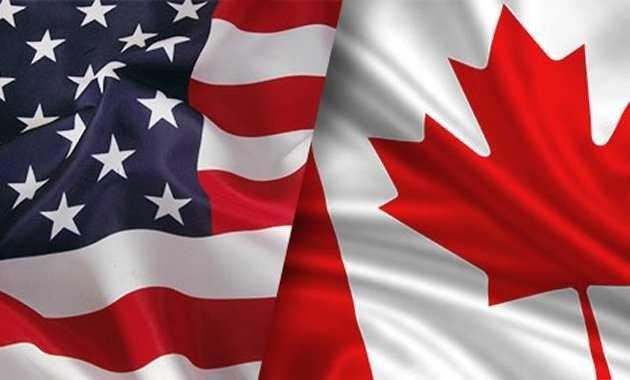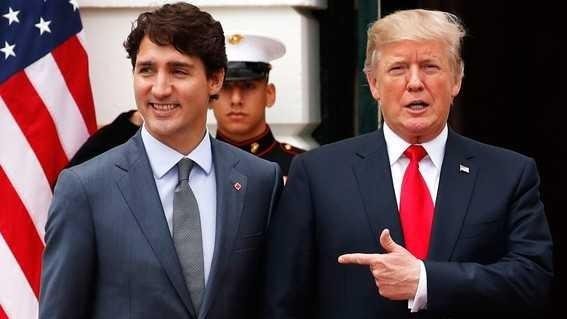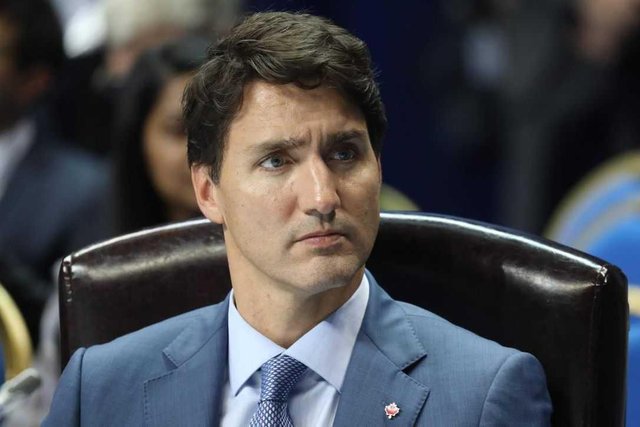Canada, the inverted US mirror of Trump - Canadá, el espejo invertido de los EEUU de Trump -Kanada, der umgekehrte US-Spiegel von Trump

It's the Canada of Justin Trudeau.
A country that has even liberalized the use of marijuana throughout its territory. More contrasts with the US, where the federal government is at war with the states and territories that have adopted that measure, impossible. With this perspective, it is not surprising that the Spanish Prime Minister, Pedro Sánchez, visited Trudeau on the eve of his speech at the recent UN General Assembly.
But Trudeau's Canada is also discovering that the phrase of the Mexican dictator Porfirio Diaz is applicable to the neighbors of the North of the USA: "So far from God and so close to the US". Two weeks ago, Trudeau had to make significant concessions to Washington in the renegotiation of the Free Trade Agreement (NAFTA) to meet Trump's demands.
With a GDP that is only 9% of that of its neighbor to the south, and a population smaller than that of the state of California (and there are still two million people left), Canada is trapped by dependence on the US, the country to which they go 85% of its exports and from which 60% of its purchases abroad come.
Trudeau's attempts to diversify Canadian trade relations with the EU and Asian countries will not generate an alternative to the US. And even less so after the new treaty Ottawa - and, also, Mexico - essentially renounces the establishment of trade agreements with China without the acquiescence of Washington.
But it's not just the US. Trudeau's Canada - which next year faces a reelection in which it starts, in principle, as a favorite - is not immune to the political changes that the whole West is experiencing. Canada is also experiencing the collapse of the old policy, with a prime minister whom his rivals accuse of being much better in 'selfie' than in the government, and who, among their fellow citizens, and as is usually the case in these cases (think of Felipe González in the 80s or José María Aznar at the beginning of the last decade) is seen not as a rock star, but as a politician. These are some of the axes of the Trump alternative of North America.
IMMIGRATION
The cynics say that Canada is a country founded by descendants of French Catholics and Protestant Anglo-Saxons who have done everything possible to ignore each other for four centuries, which has generated a very special national feeling. Anyway, Canada has not fallen into the nativism of the US and, in fact, the attempt by then Prime Minister Stephen Harper to play the nationalist and Islamophobic card in the 2015 elections was one of the reasons that catapulted Trudeau to the Government.
The Canadian immigration policy has been cited as an example by the Trump Government itself, because it is based on the attraction of highly qualified personnel. Trudeau has reinforced this trend with a system of issuing work visas in just two weeks for highly qualified workers or researchers.
The excuse that Canada can choose its immigrants more easily because it has no border with Mexico or with any developing country is only valid to a certain extent, since it is estimated that half of the undocumented people living in the United States have entered as God sends, crossing the customs of the airports with the papers in order, and then staying more than allowed their visas.
Canada also has a system of sponsoring refugees through private organizations. Yes, the number of refugees that the country admits is not high either: around 25,000 a year, and in recent years the rejection of newcomers has been rising in the polls. In any case, one of the things that draw attention in cities like Montreal is the number of posters and advertisements in Spanish.
THE END OF THE 'OLD POLITICS'
Trudeau won the 2015 elections largely because, it was supposed, represented the new policy, albeit with a life-long acronym, those of the Liberal Party, with which his father, Pierre, had already been prime minister in the 1960s, 70 and 80. In the absence of a year for re-election, however, other parties are assuming that renovating flag.
The most spectacular case came two Sundays ago, in the elections in the province of Quebec, where the Coalition for the Future of Quebec (CAQ, according to its acronym in French) swept, while the secessionists of the Quebecois Bloc sank to the extreme of not to form a group of its own in the regional Parliament. It is the first time in half a century that neither nationalists nor liberals form government in Quebec. Above, the Coalition for the Future of Quebec has barely a decade of existence, and the other great winner has been the Left Solidarity Party, which aims, among other things, to prohibit the sale of cars that work only with gasoline or diesel in 2030
But the changes go further. QAC wants to reduce the entrance of immigrants in Quebec by 20%, and threatens to expel new arrivals who do not learn French in three years, even though the provincial government has no authority to do so. The triumph of this center-right group comes three months after the Progressive Conservatives of Doug Ford, a politician who has been described as the Canadian Trump, won in the province of Ontario. Ford is, like the American, a conservative populist born into a millionaire family but who connects with the man in the street, and who is also hated by both the elites of his party and those of the opposition. The new prime minister of Ontario, however, has avoided the racism and xenophobia of the White House tenant.

Es la Canadá de Justin Trudeau.
Un país que hasta ha liberalizado en todo su territorio el consumo de marihuana. Más contrastes con EEUU, donde el Gobierno federal está en guerra con los estados y territorios que han adoptado esa medida, imposible. Con esa perspectiva, no es de extrañar que el presidente del Gobierno español, Pedro Sánchez, visitara a Trudeau en vísperas de su intervención en la reciente Asamblea General de la ONU.
Pero la Canadá de Trudeau también está descubriendo que la frase del dictador mexicano Porfirio Díaz es aplicable a los vecinos del Norte de EEUU: "Tan lejos de Dios y tan cerca de EEUU". Hace dos semanas, Trudeau tuvo que hacer concesiones significativas a Washington en la renegociación del Tratado de Libre Comercio (NAFTA) para satisfacer las exigencias de Trump.
Con un PIB que es sólo el 9% del de su vecino del sur, y una población menor que la del estado de California (y aún sobran dos millones de personas), Canadá está atrapada por la dependencia de EEUU, el país al que van el 85% de sus exportaciones y del que proceden el 60% de sus compras en el exterior.
Los intentos de Trudeau de diversificar las relaciones comerciales canadienses con la UE y los países de Asia no van a generar una alternativa a EEUU. Y menos aún después de que en el nuevo tratado Ottawa -y, también, México- esencialmente renuncie al establecimiento de acuerdos comerciales con China sin la aquiescencia de Washington.
Pero no es sólo EEUU. La Canadá de Trudeau -que el año que viene se enfrenta a una reelección en la que parte, en principio, como favorito- no es inmune a los cambios políticos que vive todo Occidente. Canadá vive también el colapso de la vieja política, con un primer ministro al que sus rivales acusan de ser mucho mejor en 'selfie' que en el Gobierno, y que, entre sus conciudadanos, y como suele ser normal en estos casos (pensemos en Felipe González en los 80 o en José María Aznar a principios de la década pasada) es visto no como una estrella del rock, sino como un político más. Éstos son algunos de los ejes de la alternativa a Trump de América del Norte.
INMIGRACIÓN
Los cínicos dicen que Canadá es un país fundado por descendientes de franceses católicos y anglosajones protestantes que han hecho todo lo posible por ignorarse los unos a los otros durante cuatro siglos, lo que ha generado un muy especial sentimiento nacional. Sea como sea, Canadá no ha caído en el nativismo de EEUU y, de hecho, el intento del entonces primer ministro Stephen Harper de jugar la carta nacionalista e islamófoba en las elecciones de 2015 fue una de las razones que catapultaron a Trudeau al Gobierno.
La política migratoria canadiense ha sido citada como ejemplo por el propio Gobierno de Trump, porque se basa en la atracción de personal altamente cualificado. Trudeau ha reforzado esa tendencia con un sistema de expedición de visados de trabajo en sólo dos semanas para trabajadores o investigadores altamente cualificados.
La excusa de que Canadá puede escoger a sus inmigrantes más fácilmente porque no tiene frontera con México o con ningún país en vías de desarrollo sólo es válida hasta cierto punto, ya que se estima que la mitad de los indocumentados que viven en EEUU han entrado como Dios manda, cruzando las aduanas de los aeropuertos con los papeles en regla, y luego quedándose más de lo que permitían sus visados.
Canadá también tiene un sistema de esponsorización de refugiados por medio de organizaciones privadas. Eso sí: el número de refugiados que el país admite tampoco es alto: alrededor de 25.000 al año, y en los últimos años el rechazo a los recién llegados ha ido subiendo en las encuestas. En todo caso, una de las cosas que llaman la atención en ciudades como Montreal es el número de carteles y anuncios en español.
EL FIN DE LA 'VIEJA POLÍTICA'
Trudeau ganó las elecciones de 2015 en buena medida porque, se suponía, representaba la nueva política, aunque con unas siglas de toda la vida, las del Partido Liberal, con el que ya había sido primer ministro su padre, Pierre, en los 60, 70 y 80. A falta de un año para la reelección, sin embargo, otros partidos están asumiendo esa bandera renovadora.
El caso más espectacular llegó hace dos domingos, en las elecciones en la provincia de Quebec, donde la Coalición por el Futuro de Quebec (CAQ, según sus siglas en francés) arrasó, mientras que los secesionista del Bloque Quebequés se hundieron hasta el extremo de no llegar a formar grupo propio en el Parlamento regional. Es la primera vez en medio siglo que ni los nacionalistas ni los liberales forman gobierno en Quebec. Encima, la Coalición por el Futuro de Quebec apenas tiene una década de existencia, y el otro gran vencedor ha sido el Partido Solidario, de izquierda, que pretende, entre otras cosas, prohibir la venta de coches que funcionan sólo con gasolina o gasoil en 2030.
Pero los cambios van más lejos. QAC quiere reducir en un 20% la entrada de inmigrantes en Quebec, y amenaza con expulsar a los recién llegados que en tres años no aprendan francés, a pesar de que el Gobierno provincial no tiene autoridad para ello. El triunfo de este grupo de centroderecha llega tres meses después de que en la provincia de Ontario ganaran los Conservadores Progresistas de Doug Ford, un político que ha sido calificado como el Trump canadiense. Ford es, como el estadounidense, un populista conservador nacido en una familia millonaria pero que conecta con el hombre de la calle, y al que también odian tanto las élites de su partido como las de la oposición. El nuevo primer ministro de Ontario, sin embargo, ha evitado el racismo y la xenofobia del inquilino de la Casa Blanca.

Es ist das Kanada von Justin Trudeau.
Ein Land, das die Verwendung von Marihuana in seinem gesamten Hoheitsgebiet sogar liberalisiert hat. Mehr Kontraste mit den USA, wo die Bundesregierung im Krieg mit den Staaten und Territorien, die diese Maßnahme angenommen haben, ist unmöglich. Angesichts dieser Perspektive ist es nicht überraschend, dass der spanische Premierminister Pedro Sánchez am Vorabend seiner Rede bei der jüngsten Generalversammlung der Vereinten Nationen Trudeau besuchte.
Aber Trudeaus Kanada entdeckt auch, dass der Satz des mexikanischen Diktators Porfirio Diaz auf die Nachbarn des Nordens der USA anwendbar ist: "So weit weg von Gott und so nah an den USA". Vor zwei Wochen musste Trudeau Washington bei der Neuverhandlung des Freihandelsabkommens (NAFTA) wesentliche Zugeständnisse machen, um Trumps Forderungen zu erfüllen.
Mit einem BIP, das nur 9% von dem seines Nachbarn im Süden ist, und einer Bevölkerung, die kleiner ist als die des Staates Kalifornien (und es sind immer noch zwei Millionen Menschen übrig), ist Kanada durch die Abhängigkeit von den USA, dem Land, in das sie gehen, gefangen 85% seiner Exporte und von denen 60% seiner Einkäufe ins Ausland kommen.
Trudeaus Versuche, die kanadischen Handelsbeziehungen mit der EU und asiatischen Ländern zu diversifizieren, werden keine Alternative zu den USA schaffen. Und noch weniger nach dem neuen Vertrag verzichtet Ottawa - und auch Mexiko - im wesentlichen auf den Abschluß von Handelsabkommen mit China ohne die Zustimmung Washingtons.
Aber es sind nicht nur die USA. Trudeaus Kanada - das im nächsten Jahr einer Wiederwahl gegenübersteht, in der es im Prinzip als Favorit beginnt - ist nicht immun gegen die politischen Veränderungen, die der ganze Westen erlebt. Kanada erlebt auch den Zusammenbruch der alten Politik, mit einem Premierminister, den seine Rivalen beschuldigen, in "selfie" viel besser zu sein als in der Regierung, und wer unter ihren Mitbürgern, und wie es in diesen Fällen gewöhnlich der Fall ist Felipe González in den 80er Jahren oder José María Aznar zu Beginn des letzten Jahrzehnts) wird nicht als Rockstar, sondern als Politiker gesehen. Dies sind einige der Achsen der Trump-Alternative von Nordamerika.
Einwanderung
Zyniker sagen, dass Kanada ein Land von den Nachkommen der Französisch katholischen und protestantischen angelsächsischen Land gegründet ist, die ihr Bestes getan haben einander über vier Jahrhunderte zu ignorieren, die eine ganz besondere Nationalgefühl geschaffen hat. Wie dem auch sei, hat sich Kanada nicht in nativism US gefallen, und zwar der Versuch des damaligen Premierminister Stephen Harper die nationalistische Karte und islamophobischen bei den Wahlen von 2015 war einer der Gründe, zu spielen, die Trudeau an die Regierung katapultiert.
Die kanadische Einwanderungspolitik wurde von der Trump Regierung selbst als Beispiel angeführt, weil sie auf der Anziehung hochqualifizierter Mitarbeiter beruht. Trudeau hat in nur zwei Wochen für Arbeiter oder hochqualifizierte Forscher für die Erteilung von Arbeitsvisa diesen Trend mit einem System verstärkt.
Die Ausrede, dass Kanada ihre Einwanderer kann wählen, leichter, weil es keine Grenze zu Mexiko oder einem Entwicklungsland hat, ist zu einem gewissen Grad nur gültig, da sie eingegeben wird geschätzt, dass in den USA die Hälfte der Einwanderer ohne Papiere leben als Gott schickt die Zollabfertigung der Flughäfen mit den Papieren in Ordnung und bleibt dann mehr als erlaubt ihre Visa.
Kanada hat auch ein System, Flüchtlinge durch private Organisationen zu unterstützen. Ja: Die Zahl der Flüchtlinge zugelassen, dass das Land nicht hoch: etwa 25.000 pro Jahr, und in den letzten Jahren die Ablehnung der Neuankömmlinge in den Umfragen ist gestiegen. Auf jeden Fall ist eines der Dinge, die in Städten wie Montreal auffallen, die Anzahl der Plakate und Anzeigen in Spanisch.
Das Ende der "alten Politik"
Trudeau gewann die Wahlen im Jahr 2015 vor allem, weil davon ausgegangen wurde, repräsentiert die neue Politik, obwohl ein Akronym des Lebens, die Liberale Partei, die bereits Premierminister gewesen war, sein Vater, Pierre, in den 60er Jahren, 70 und 80. In der Abwesenheit eines Jahres für die Wiederwahl nehmen jedoch andere Parteien an, dass die Fahne erneuert wird.
Der spektakulärste Fall kam am vergangenen Sonntag bei den Wahlen in der Provinz Quebec, wo die Koalition für die Zukunft von Quebec (CAQ, nach dem Akronym in Französisch) den Erdboden gleichgemacht, während der sezessionistische Bloc Quebecois bis zum Ende sank keine eigene Gruppe im regionalen Parlament zu bilden. Es ist das erste Mal seit einem halben Jahrhundert, dass weder Nationalisten noch Liberale die Regierung in Quebec bilden. Oben hat die Koalition für die Zukunft von Quebec nur ein Jahrzehnt ihres Bestehens hat dich die anderen großen Gewinner die Solidaritätspartei, linksorientiert, gewesen, die unter anderem Ziel, verbietet den Verkauf von Autos, die nur auf Benzin oder Diesel laufen in 2030
Aber die Veränderungen gehen noch weiter. QAC will um 20%, den Zustrom von Einwanderern in Quebec zu reduzieren, und droht Neulinge, die in drei Jahren zu vertreiben werden Französisch nicht lernen, auch wenn die Landesregierung nicht befugt, dies zu tun hat. Der Triumph dieser Gruppe von Mitte-Recht kommt drei Monate nach der Provinz Ontario Progressive Konservative den Doug Ford gewann, einen Politiker, den die kanadische Trump genannt wurde. Ford ist, wie die USA, ein konservativer Populist in einer wohlhabenden Familie geboren, aber die auf der Straße an den Mann verbindet, und die hassen beide auch die Eliten seiner Partei als die Opposition. Der neue Premierminister von Ontario wird jedoch von Rassismus und Fremdenfeindlichkeit Mieter des Weißen Hauses vermieden.